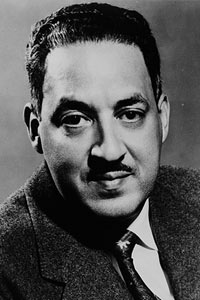Historic appointment of Marshall to high court shapes speaker series
By Sabrina L. MillerNews Office
 Thurgood Marshall | |
The Black Law Students Association is kicking off a yearlong speakers series to commemorate the 40th anniversary of the historic appointment of Thurgood Marshall as the first African American to serve on the U.S. Supreme Court.
Cass Sunstein, the Karl N. Llewellyn Distinguished Service Professor of Jurisprudence in the Law School, who clerked for Marshall in the early 1980s, will open the speaker series today.
After being denied admission to the University of Maryland because of his race, Marshall enrolled in Howard University, where he received his law degree. He then became a prominent and prolific attorney, making history even before President Lyndon Johnson appointed him to the Supreme Court in 1967.
He was chief counsel to the NAACP and argued, before the U.S. Supreme Court, the landmark Brown v. Board of Education case that struck down state-sponsored segregation in schools.
“We wanted to do something to reflect Justice Marshall’s contribution to the legal landscape and to the African-American community,” said Euler Bropleh, a second-year law student.
President John Kennedy appointed Marshall to the U.S. Court of Appeals for the Second Circuit in 1954, and President Johnson appointed Marshall to the office of U.S. Solicitor General in 1965. Marshall also worked with the United Nations in helping to draft the constitutions of the African nations of Ghana and Tanzania, among many other legal accomplishments.
Sunstein said he was honored to open the series, adding that the opportunity to work with Marshall had left an indelible impression on him as a young attorney. In addition to working hard, Sunstein said he remembers his time clerking for Marshall as being exciting, dramatic and surreal. He got the clerkship by “luck – tons of qualified people wanted to work for him, and I was struck by lightning I guess.
“He was larger than life – physically, but in all ways. He didn’t take himself too seriously,” Sunstein said of Marshall. “He was hardly full of himself or his achievements; he thought about cases and other people, not himself. He took the law, and its potential to do well and to be better, very seriously.”
The series will continue Wednesday, Jan. 17, 2007, with author Kevin McMahon. Harvard law professors David Wilkins and Randall Kennedy are scheduled to speak in March, followed by attorney Al Dodson and former U.S. Solicitor General Drew Days III in April.
![[Chronicle]](/images/sidebar_header_oct06.gif)